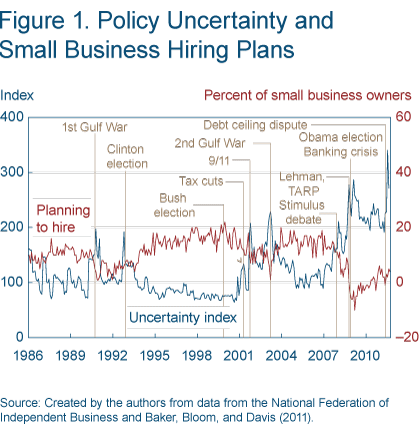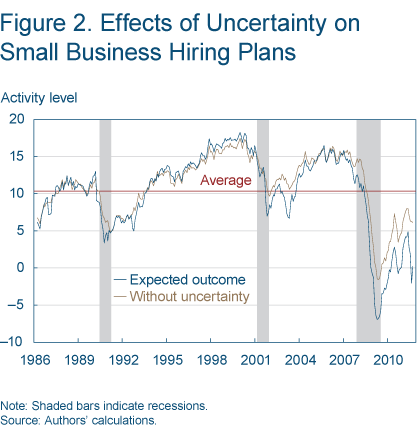US Policy Uncertainty Affecting Business Expansion And Job Creation
Please note that we are not authorised to provide any investment advice. The content on this page is for information purposes only.
Small business owners would hire and invest more if Washington offered a clearer plan for taxes and government spending, said a report by the Federal Reserve Bank of Cleveland on Tuesday.
“While the downturn and weak recovery certainly had a large negative effect on small business hiring plans, policy uncertainty has exacerbated this effect,” claimed researchers Mark Schweitzer and Scott Shane in their report.
Small business owners would hire and invest more if Washington offered a clearer plan for taxes and government spending, said a report by the Federal Reserve Bank of Cleveland on Tuesday.
“While the downturn and weak recovery certainly had a large negative effect on small business hiring plans, policy uncertainty has exacerbated this effect,” claimed researchers Mark Schweitzer and Scott Shane in their report.
Related: Understanding Uncertainty – A Framework For The Global Economy: Mohamed El-Erian
Related: The American Economy Is In Danger of Stalling: Mohamed El-Erian
The researchers utilised a policy uncertainty index, which measured uncertainty based on numerous factors, including: the amount of newspaper coverage of the topic, the number of tax provisions set to expire in the coming years, as well as the level of disagreement between economic forecasters on the future of the economy.
The researchers then plotted this data against two monthly measures conducted by the National Federation of Independent Business (NFIB), which showcased the willingness of small businesses to hire and invest.
The results showed a strong correlation between economic policy uncertainty and business plans with business expansion and hiring policies shrinking whenever policy uncertainty rose. For instance, the percentage of businesses planning to hire would have been 6 points higher in the summer of 2011 if not for the effects of uncertainty. The toll on capital expenditures, which include investments in equipment and buildings, was similar.
Credit: Federal Reserve Bank of Cleveland
The authors, though, were quick to point out that a strong correlation need not necessarily mean causation.
[quote]“We cannot say that ‘policy uncertainty’ causes small-business hiring and capital expenditure plans to decline. That is because a purely statistical model cannot identify fundamental causes. We can say that the correlations between the two are strong enough to reject the argument that policy uncertainty is irrelevant for currently weak small-business expansion plans.”[/quote]The results comes just a week after a political gridlock in Washington failed to resolve the debt ceiling debate that has plagued the US for the last few months.
Related: US Debt Supercommittee Ready to Concede Defeat Over Budget Agreement
Related: China is Sick of US Hollow Promises and Reckless Government: Stephen S. Roach
Related: Doomed for Disaster – America’s Dangerous Debt Deal: Michael Mandelbaum
In a column for Bloomberg Businessweek, the report’s co-author Scott Shane listed three suggestions on how to reduce policy uncertainty in the country.
“First, our elected officials need to stop passing temporary legislation in place of permanent policies because those laws create too much uncertainty for small business owners, who need to forecast future costs and revenues to make decisions. Second, Congress and the President need to stop enacting laws that require months or even years of bureaucratic interpretation before small business owners can figure out what the provisions mean. Third, those in Washington need to refrain from enacting legislation so complex that no one can understand its implications.”
“By reducing policy uncertainty, our elected officials can help small business owners expand again, creating jobs and boosting GDP. That seems a small cost to pay to get the economy going again.”






